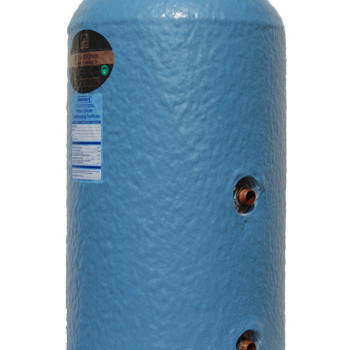
We have covered your home heating options extensively over the years, but here we are going to have a look at the options you have for your hot water.
Boiler
For those with a gas boiler, heating your water this way is going to generally be the cheapest option, just like with your central heating. You will have one of 2 setups – either a combi boiler that heats your hot water on demand, or a boiler with a separate cylinder. The boiler is a long established means of getting hot water for your home.
>> Click here to find out more information whether a combi boiler is a suitable option <<
Put simply, heating your water via your central heating gas boiler is your cheapest and most efficient option, if you have it. Of course, many people don’t have gas, so it is not always an option.
>> Find out whether a biomass boiler is a viable option for your home by clicking here <<
You can have a biomass boiler or an oil boiler heating the hot water, if you are off-gas grid.
Instantaneous Hot Water Heater
If you don’t have gas central heating, and perhaps live in a flat or smaller property where space is at a premium, having a big old cylinder to heat and store your hot water can be a pain. Instantaneous hot water heaters are a small efficient box that will ensure you have hot water as and when you need it. This can be a gas or electric system, depending on the fuel in the property, and you can get single point or multi point heaters – that is, a heater that provides hot water at just one location, or one that provides it for several locations in the home.

If you have a hot water cylinder, you will have an immersion heater. This device heats the water in the cylinder like a kettle using electricity. That makes it quite expensive to run. Not only are you heating the water using a fuel that is 3 or 4 times the price of gas, you are storing that heated water in a container that will gradually leak that heat, making it even more inefficient than an instantaneous heater.
Of course, you can reduce this heat loss with a good quality tank with thick insulation, or a woolly jacket. Eventually however, the hot water is lost unless you use it. We recommend that unless your immersion is your primary means of heating your water, you should never turn the immersion on. It is just too wasteful. Just keep it as a backup for when your boiler is on the blink.
Solar Thermal
Solar thermal is a simple yet effective renewable technology. Your water is passed though a device that utilises the heat of the sun to warm the water and keep it in a thermal store, or large cylinder. You can find out more about solar thermal here.
The problem with relying on solar thermal is that during colder months, there won’t be enough energy in the sun to get the temperature up to a suitable level for showers etc. Most solar thermal systems will be a secondary system with a boiler or heat pump providing additional heat when the sun isn’t adequate.
Other renewable Options
There are other ways of heating your water. Heat pumps are a real emerging technology and are a really efficient way of heating your water. Obviously this is generally a whole house heating solution and not just for hot water.
Heating Controls
Whilst having a nice efficient system for heating your water is important, the controls are equally so. The last thing you want is to waste energy overheating your water.
The most basic requirement is a programmer of some sort. Most systems have a dial that lets you set when the water comes on and off. Make sure you use this wisely and don’t heat water when you don’t need it.
Cylinder thermostats are a simple device that sit on your cylinder and cut the heating off when the water hits a preset temperature. This ensures that you aren’t overheating your water and wasting energy.
What is the best way to heat your water?
There are plenty of options open to you for heating your water. Generally speaking you are better using the same system that heats your home, rather than an independent heater. Also make sure that you aren’t heating your water unnecessarily or overheating it. You can have a great boiler that is ultra efficient, but if your cylinder has poor insulation, or no controls, then you won’t see the benefits.
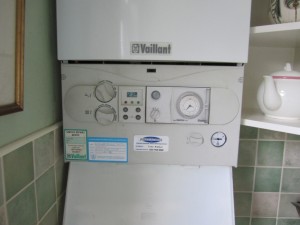
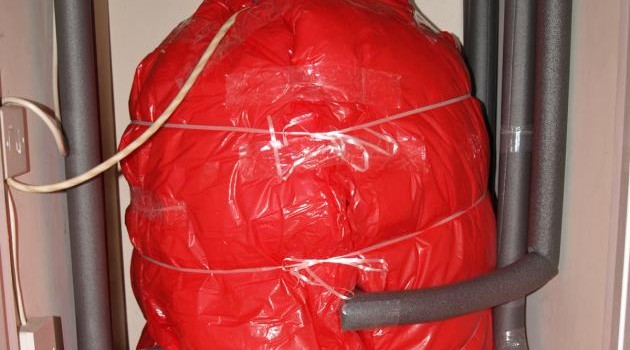
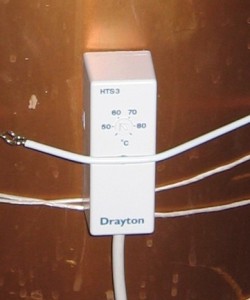





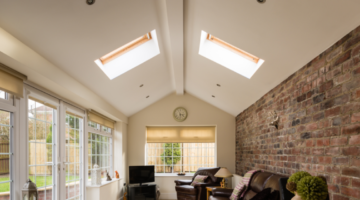
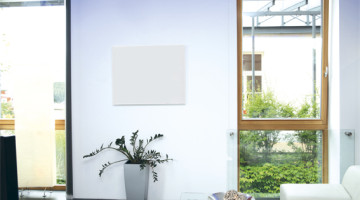





I had 12 Solar PV panels rated at 2.7kW installed in December 2011 and recently (November 2014) re–invested my FIT payment in a Solar I-boost which first detects when we are “exporting” and then switches on our immersion heater. Even though it winter this is proving to be very effective at reducing our gas useage as our boiler heats our small home and water.
I plan to re-invest my 2015 FIT payments into a Rain-Water Harvesting system and via filters, then pump it once per day into a secondary tank in the loft SOLELY to feed our WC. Payback target 6 years.
NB There are several safety features which we must comply with so research is essential whilst planning.
This should reduce our (for two poeple) annual water bill by about 1/3rd.
The pump will of course use Solar PV generated electricity.
I estimate that Capital Costs should be under £1K.
Has anyone any suggstions/advice please?
No.